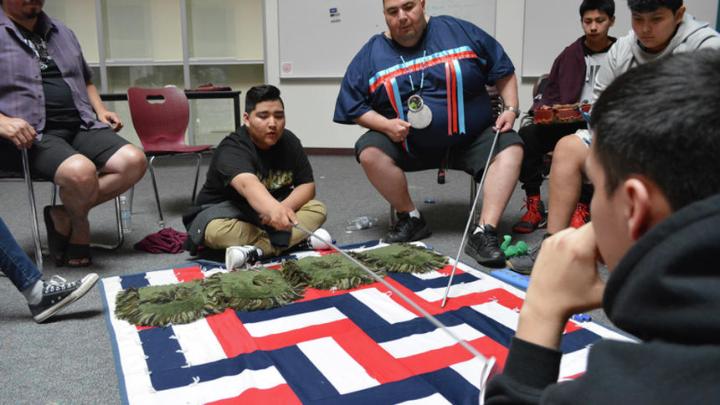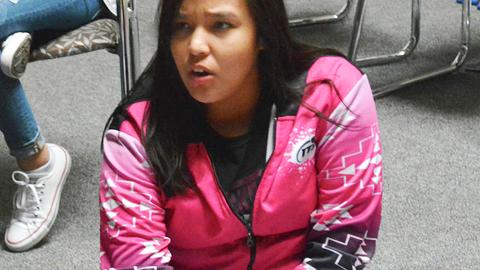 |
Canku Ota
|
 |
|
(Many Paths)
|
||
|
An Online Newsletter
Celebrating Native America
|
||
|
June 2018 - Volume 16
Number 6
|
||
|
|
||
|
Passing Down An Ancient
Game: Cass Lake-Bena Students Participate In Moccasin Game Tournament
|
||
|
by Joe Bowen - Bemidji
Pioneer
|
||
BEMIDJI—As his teammate drummed, a Cass Lake-Bena High Schooler used a long stick to confidently flick aside a cloth square. Underneath? A green marble—the wrong marble. The student grudgingly tossed a handful of sticks to his opponent.
The tournament encouraged students there to practice their sportsmanship and their focus, but it also aimed to sustain a longstanding cultural tradition, said organizer Charles Grolla, a retired Red Lake law enforcement officer who teaches Ojibwe language and culture at the high school. "I wanted to teach and pass on what I knew about the language and culture," Grolla said. "When I was a kid in Red Lake, I needed to know a little bit of Ojibwe to get by. Whereas now you don't hear it as much anywhere." Students play regular pickup Moccasin Games on Fridays, Grolla said. The tournament was a way to earn bragging rights that could last through the summer. The game itself is intricate and often intense. At its core: teams of 2-5 players sit across a blanket from one another. On the blanket are pieces of cloth—moccasins, traditionally—and teams alternately attempt to hide or uncover a specially marked marble amidst three unmarked ones underneath the cloth pieces. More rules and strategies cascade from there. Successfully finding or hiding the right marble can earn a team sticks, which they use to keep score. Twenty sticks nets a "soldier"—a shorter, fatter scorekeeping stick. Five soldiers is a win. It took senior Saige Humphrey about two years to fully understand the game, he said. "I just had to jump in and play," Humphrey explained. Players hide the marbles one at a time under the oven mitt-like pieces of cloth, and a slight twitch of their eye might give away that they've stashed the marked marble. "It sounds easy, and I think people already have an inherent thought that our games, traditional games, are really easy," he said. "It's complex, just like the language." Grolla also impressed upon his students the game's cultural significance. He put together a sort-of textbook that explains the rules, the game mechanics, and the legend of its creation. He taught students there the Ojibwe and Dakota versions of Moccasin Game. "Makwa, the bear, gave us the game," he said. Humphrey explained that the thumping of drums during the game corresponds to the bear's heartbeat; the sticks players use to its claws; the pieces of cloth to its paws. Grolla declined to tell the full legend without snow on the ground.
|
||||
|
|
|
|
||
|
|
||
| Canku Ota is a free Newsletter celebrating Native America, its traditions and accomplishments . We do not provide subscriber or visitor names to anyone. Some articles presented in Canku Ota may contain copyright material. We have received appropriate permissions for republishing any articles. Material appearing here is distributed without profit or monetary gain to those who have expressed an interest. This is in accordance with Title 17 U.S.C. Section 107. | ||
|
Canku Ota is a copyright ©
2000 - 2018 of Vicki Williams Barry and Paul Barry.
|
||
 |
 |
|
|
The "Canku
Ota - A Newsletter Celebrating Native America" web site and
its design is the
|
||
|
Copyright ©
1999 - 2018 of Paul C. Barry.
|
||
|
All Rights Reserved.
|
||

